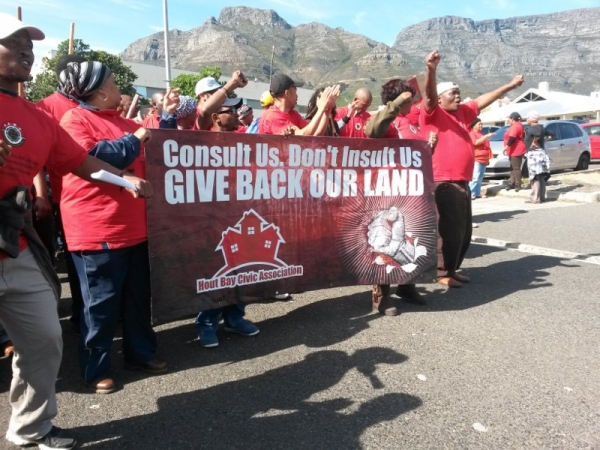Keep fish factory open, demand Hout Bay residents

Protesters in Cape Town demanded that the Oceana fish factory remain open. Photo by Barbara Maregele.
About 100 people marched through the streets of Cape Town on Friday against the possible closure of Oceana’s Hout Bay Fishmeal Factory.
On 14 August, Oceana announced the proposed closure of the 56 year old factory, which would affect 98 employees. The company has cited complaints from the community about the smell from the factory as well as their inability to maintain financial viability with the current low level of production.
Groundup previously reported that in the past three years, Oceana has reduced production to “less than 40% of the normal annual production” but complaints have still escalated. If the closure goes ahead, the affected employees will be given the option to relocate to St Helena Bay which is 175km from Hout Bay, or may be deployed to other available posts within the company. If the workers are unable or not willing to relocate, they will be given the option of voluntary severance packages.
On Friday, the sound of singing and banging drums could be heard along the route to the Civic Centre and the Oceana Group’s head offices in the CBD where the group, dressed in red, black and yellow, handed over a memorandum asking for the factory to remain open.
One of the protesters, Zubeida Baadjies, 44, has lived in Hout Bay with her family for as long as she can remember. Baadjies, a single mother of four, has been working as a cleaner at the factory for seven years. “How are we going to live? I live a few metres from the factory and nothing ever happened to my children. Our neighbours never complained about the smell,” she said. Baadjies said relocating would mean moving her children away from relatives who also live in the area.
“We are going to suffer there [St Helena Bay]. Where will we stay if we go there? This is our home. We know the people in Hout Bay. I still have children that go to school in the area. I can’t do that. How will we survive there?” she said.
Another protester, Peter Warner, started as a fork lift operator and says he worked his way up over 30 years to his current post as a supervisor. “We don’t know what the real reason is for them needing to close down the factory. Some people say it’s because of the complaints about the smell and others say they want to develop that part into a waterfront,” he said. “Moving isn’t an option for me because I was born in Hout Bay. All my family live there and we can’t afford to move. I just hope that the negotiations will be successful and we will still have jobs this time next year,” he said.
Leading the march, Food and Allied Workers Union (FAWU) general secretary Katishi Masemola said the closure of the factory would result in “severe socio-economic setbacks” for the poor in Hout Bay. “These workers have families that depend on their wages. This factory has been open since 1958 and that smell hasn’t killed anyone. The complaints are by the rich minority who have just come into the area and want to enjoy the views of Hout Bay alone,” he said.
In the memorandum read by Masemola outside the Civic Centre, FAWU expressed its “disgust” at the City of Cape Town in the way in dealt with the factory’s permit dispute. “It is our belief that the accusations of violations of environmental regulations stems from the complaints by a small minority with interests in gentrifying the poor out of Hout Bay,” he read.
“We reject the plans of the City, provincial and national government to turn this part of Hout Bay into an enclave of the wealthy on the basis of excluding the poor and working people,” he read. Accepting the memorandum on behalf of Mayor Patricia de Lille, Wilfred Solomons-Johannes told the group that the closure of the factory was solely the decision of the Oceana Group. He said De Lille has instructed City officials to engage with Oceana management over the closure.
“In 2010, national government instituted a new law called the National Air Quality Act which regulates what companies like Oceana are emitting into the air. The City has to adhere to these regulations,” he said.
Outside Oceana Group’s head office, also in the CBD, group CEO Francois Kuttel commended the group on their peaceful march.
In response to the memorandum that called for joint discussions between the various parties, Kuttel said, “We are not anti-labour. We will continue to engage with the relevant role players and the leadership of FAWU. We have been fighting this battle for years and there are a number of challenges.”
“I grew up in that valley and I’ve seen the impact the factory has made to the different communities over the years,” Kuttel said. He said they have made no final decisions about the closure of the factory.
The protesters said De Lille and Kuttle have until 18 September to respond in writing to FAWU. The union has vowed to continue protest action until their demands have been answered.
Support independent journalism
Donate using Payfast

Don't miss out on the latest news
We respect your privacy, and promise we won't spam you.
Next: Act now to protect Western Cape’s bees
Previous: Zimbabwean teachers in Northern Cape are desperate following months without pay
© 2016 GroundUp. 
This article is licensed under a Creative Commons Attribution-NoDerivatives 4.0 International License.
